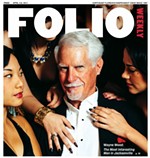Right-Wing Influence at Billy Morris's "Christian" Newspapers
Billy Morris’ newspaper chain, which sprang from his father’s 1945 purchase of a single newspaper, The Augusta Chronicle, now operates in 13 states with 61 papers. Although Morris has professed a desire for "high standards for ... employees and their newspapers" and "personal accountability," the chain’s flagship paper, The Florida Times-Union, hasn’t been held to that standard. This is especially true of the paper’s editorial page.
Instances of shabby editorial writing and apparent plagiarism have continued unabated, despite being brought to the attention of T-U managers. In fact, publisher Carl Cannon, who is directly responsible for the editorial page, was promoted in the Morris corporate hierarchy last fall from vice president of newspapers to executive vice president of newspapers. In announcing the promotion, Billy Morris’ son William S. Morris IV, heir-apparent of the expanding Morris publishing empire, said it "acknowledge[s Cannon’s] high level of responsibility and contribution."
Morris papers are ranked just 17th largest in the nation by circulation (in 2000) and fifth largest by the number of newspapers (in 1995), but they nevertheless can be a potent political force in a presidential election year.
The 26 daily, 12 non-daily and 23 free community papers that Morris holds are located in mostly small-to-mid-sized markets in 13 states in the South and Midwest, areas where the independent nature of the swing voters who reside there make editorial pages powerful political tools. Four of the states where Morris publishes (Arkansas, Florida, Michigan, Missouri) are among 20 identified as key battlegrounds in the fall presidential election, and they border another four states also up for grabs.
One of those papers is located in Hillsdale, Mich., where Hillsdale College has for decades been a center for New Right leadership forums and political activity. Times-Union editorials have routinely "borrowed" from articles in the college’s monthly magazine, Imprimis, where far-right writers regularly roast liberals (see sidebar). In his book, "One By One: Preserving Values and Freedom in Heartland America," published in 1990 by Hillsdale College Press, George Roche outlined Hillsdale’s role in fighting enemies of morality, noting the left’s attacks on "what is normal and morally healthy in favor of things everyone has always regarded as perverse."
This perspective can fairly be said to reflect that of Billy Morris. According to a May 1999 profile of the then chairman-designate of the Newspaper Association of America in Presstime, "Some critics contend that Billy uses his newspapers to push a conservative Christian agenda." The article noted Morris served as an elder of Reid Memorial Presbyterian Church in Augusta and was a director of Columbia Theological Seminary in Decatur, Ga. Morris also holds a longtime membership in the National Rifle Association, an organization known for its potent political activism.
Morris has long been directly involved in the political process, and his goals are sometimes reflected by his newspapers. Along with members of another prominent newspaper chain, he paid $950,000 to Washington, D.C., lobbyists to have the Republican-dominated Congress pass laws to reduce inheritance taxes, according to a list of the Top Media Lobbying Firms 1996 to 2000 compiled by the Center for Public Integrity. The T-U editorial page has written repeatedly about changing inheritance tax laws.
Morris makes no apology about his conservative Christian principles. In a Jan. 2, 1994 editorial in The Augusta Chronicle titled "What We Believe," Morris advocates limited government, "laissez-faire" economics, policies that foster international free trade and a move away from bilingualism. Morris’ advocacy of "open-markets" fits with the move away from public education advocated by conservatives, and reflected in T-U editorials. In the same publisher commentary, reprinted on the back page of the Fall 1995 Morris Communicator, Morris writes:
"This newspaper is owned by a Christian businessman. God is the Supreme Being of our universe, and we make no apology for defending America’s Judeo-Christian heritage and values. We strongly defend our First Amendment Freedoms at all costs!
"The opinions on this editorial page will generally be conservative, although different viewpoints are welcome and run frequently. This newspaper will never shrink from exposing crime, graft, corruption, incompetence or poor judgment by public officials ..."
He also wrote:
"The opinion pages of any good newspaper are the place for men and women of trenchant thought to make their case to the community on newsworthy topics. This goes to the heart of the editorial page mission and explains why we encourage the submission of guest columns and a vigorous letters-to-the-editor policy to develop diverse opinions, especially including those at variance with our own."
While Morris preaches about encouraging diverse opinions, that is not necessarily T-U practice. One T-U subscriber, healthcare analyst Brian R. Klepper, Ph.D., responded to a Reader Advocate column that said many "good letters" can’t be run due to content and space restraints. Klepper noted that two conservative letter writers had been published a total of 28 times in a year’s time. In his letter, Klepper asks: "Could it be that the T-U editorial staff disproportionately selects letters that represent its own narrow and ultraconservative views, and that the few writers who can both affirm these perspectives and construct a grammatical sentence get chosen whenever they submit?"
This was the response Klepper received via e-mail the next day from Lloyd Brown, the editorial page editor:
"It could be … but it isn’t. It could also be part of a vast right-wing conspiracy."
Klepper responded in an Aug. 6, 1998 letter to Carl Cannon, describing Brown’s e-mail as "a rude, unprofessional snipe at a well-intentioned and appropriately constructed comment … particularly unbecoming from the Editorial Page Editor of a major metropolitan newspaper, but precisely emblematic of the insular, ‘can’t touch me’ orientation that that department projects."
Unfortunately, that orientation hasn’t changed.





